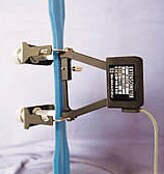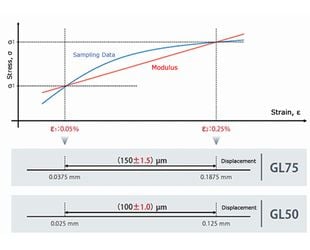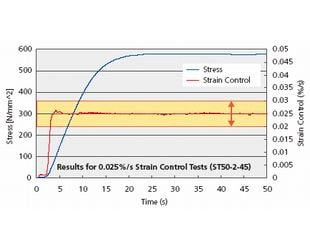The SSG series, widely used by plastics manufacturers, public testing institutions, and universities, meets the requirements of these plastic tensile testing standards.
SSG Series Strain Gauge Extensometers

Shimadzu’s SSG series of strain gauge extensometers are compliant with ISO, JIS, and ASTM tensile test standards, including those for plastics and metallic materials These lightweight, precision extensometers feature a wide elongation measurement range, while retaining the flexibility to measure using small gauge lengths, and support both rod and flat plate shaped specimens. Consisting of an elongation sensor and amplifier, this extensometer is suitable for use with metals and hard plastic materials, and is fastened securely to specimens with screws. Calibration using an extensometer calibrator allows the extensometer to meet JIS and ISO Class 0.5 and ASTM Class C standards for higher accuracy.
Features
-
Plastic tensile testing standards, represented by ISO 527, JIS K 7161, and ASTM D638, require high-accuracy displacement measurements.
The SSG series, widely used by plastics manufacturers, public testing institutions, and universities, meets the requirements of these plastic tensile testing standards. -
ISO 6892 and JIS Z 2241 detail test methods for determining the tensile strength of metallic materials. Included within these standards are two control methods for loading materials until they reach their yield point: a stress-rate controlled method and a constant strain-rate controlled method using an extensometer.
News / Events
-
AUTOGRAGH AGS-X2 Series has been released
The Shimadzu AUTOGRAPH AGS-X2 series provides superior performance and practical testing solutions for a wide array of applications. Offering high-level control and intuitive operation, the AGS-X2 series sets a new standard for strength evaluations while providing the utmost in safety considerations in a modern, stylish design.
-
AUTOGRAGH AGS-V Series has been released
Shimadzu Corporation released the Autograph AGS-V Series precision universal testing machine. In this series, the range over which the force measurement accuracy is guaranteed has been increased by a factor of two compared with existing machines. As a result of this new function, the work required to change force measurement sensors and accessories required for measurement can be reduced.
-
High-Speed Video Camera HyperVision HPV-X3 has been released
Recording speed of 20 million frames/second, the highest in its class provides larger, clearer, high-sensitivity recording. HPV-X3 is equipped with a synchronized recording function and high-level analytical capabilities that accommodate a variety of software programs.
-
New Video: AUTOGRAPH AGX-V2 Voice Operation Device XV-Talk
We will introduce how XV-Talk, the world's first voice control device installed in Shimadzu's latest tensile tester AGX-V2, can be used in various scenarios.
-
New Video: AUTOGRAPH AGX-V2 Operation Control Panel Stand-alone test feature
We will introduce a new feature of Shimadzu's latest tensile tester, AGX-V2, a stand-alone testing function using a large color LCD touch panel.
-
New Autograph AGX-V2 Series Precision Universal Testing Machines
The World’s First Testing Machines Equipped with a Voice Operation Device




